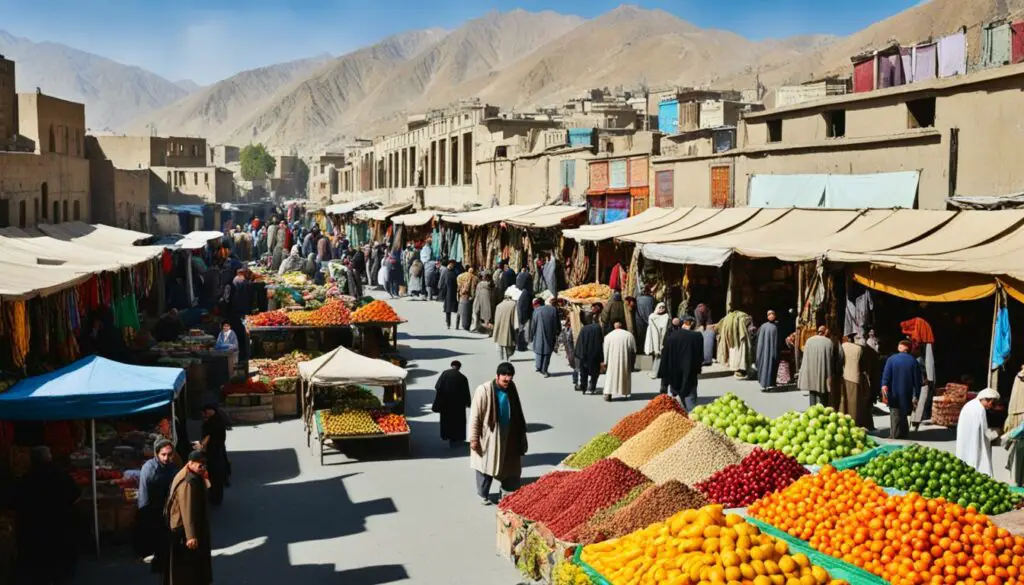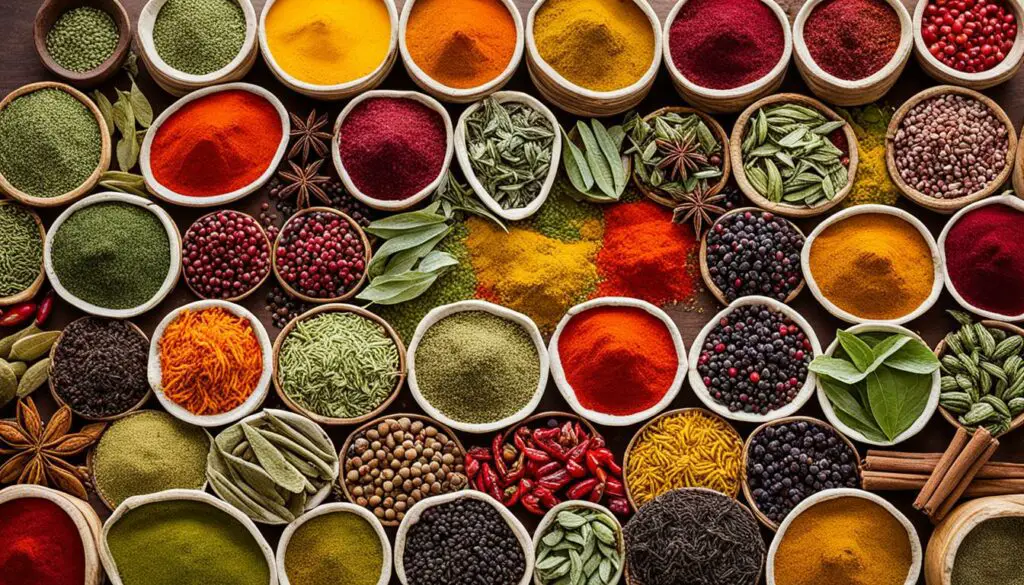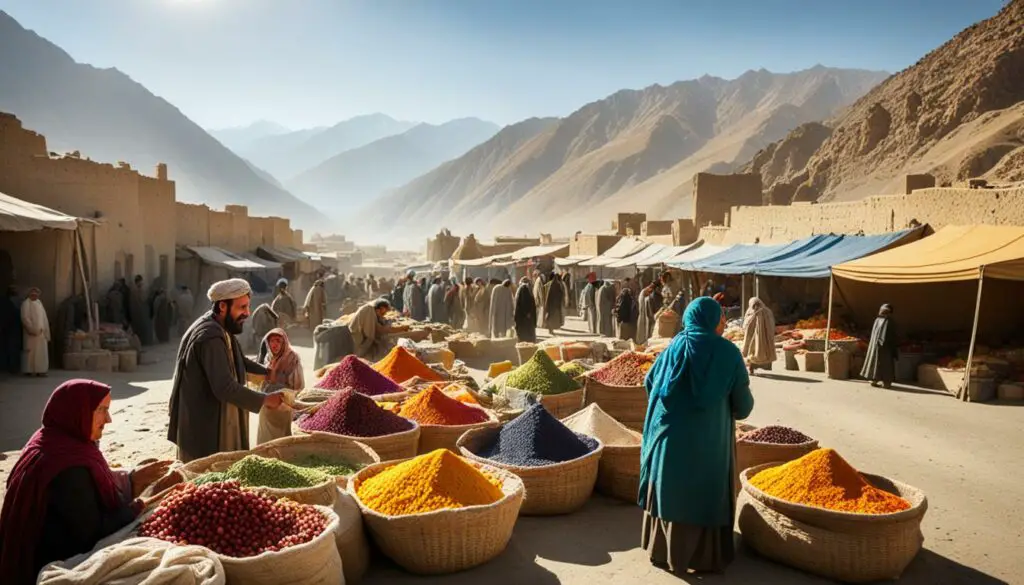Did you know that despite the challenges it faces, Afghanistan does have grocery stores available to its population? Grocery shopping in Afghanistan may be unique due to cultural norms and safety concerns, but it remains an essential aspect of daily life. In this article, we will explore the landscape of grocery shopping in Afghanistan, from the availability of grocery stores to the role of local markets and the emergence of online shopping.
Table of Contents
Key Takeaways:
- Afghanistan has grocery stores that cater to the needs of its population, despite the challenges it faces.
- Cultural norms and safety concerns influence the shopping experience in Afghanistan.
- Local markets play a crucial role in the food supply chain and are an integral part of Afghan culture.
- In the capital city of Kabul, there are several grocery store options available.
- Grocery stores and supermarkets can also be found in other Afghan cities.
Shopping Challenges and Cultural Norms in Afghanistan
In Afghanistan, grocery shopping can be a unique experience due to cultural norms and safety concerns. While the country does have grocery stores and food retailers, there are certain challenges that shoppers may encounter.
- Grocery shopping in Afghanistan: In many villages, women are not allowed to go out, making men primarily responsible for the shopping. This cultural norm significantly impacts the shopping dynamics, as it restricts a large portion of the population from participating in the grocery shopping process.
- Risk of theft: Another challenge is the risk of theft. Afghanistan has faced security issues, and this includes the possibility of theft in certain areas. Shoppers need to be vigilant and take necessary precautions to protect their belongings.
- Negotiation: Negotiation is a common practice in many Afghan markets. Unlike fixed prices in Western countries, bargaining and haggling are expected when making purchases. Shoppers should be prepared to negotiate for better prices and deals.
Despite these challenges, there are still options for grocery shopping in Afghanistan. Local markets and bazaars are popular throughout the country, offering a wide range of fresh produce, spices, and household essentials. These markets play a significant role in the Afghan retail market, providing local communities with access to food stores and other consumer goods.
“Shopping in Afghanistan is a unique experience that requires an understanding of the cultural norms and the ability to navigate the challenges. Despite these obstacles, the local markets offer a vibrant and diverse shopping experience, where negotiation and cultural customs intertwine.”
The Afghan Retail Market
Understanding the dynamics of the Afghan retail market is crucial for both shoppers and retailers. The grocery stores and food retailers in Afghanistan cater to the diverse needs of the population, taking into account the cultural norms and local preferences. While the challenges exist, the retail market continues to evolve and adapt to meet the demands of the Afghan people.
| Retailers | Location |
|---|---|
| Finest Shopping Center | Kabul |
| Afghan Spinneys | Kabul |
| A-1 | Kabul |
| Chelses | Kabul |
| Iranian Store | Kabul |
| Turkish Grocery Store | Kabul |
These are just a few examples of grocery stores in Kabul, the capital city of Afghanistan. The retail market in Kabul offers a diverse range of products, including frozen foods, fresh fruits, and vegetables, catering to the needs of both local residents and expatriates.
While Kabul is a major hub for grocery shopping, other cities in Afghanistan also have their own grocery store options. For example, Herat, Kandahar, and Balkh offer a variety of stores where residents can find their grocery essentials. These stores, such as Mansoor General Store in Balkh and Sormeh Clothing Shop in Herat, cater to the local population’s grocery needs.
It is important to note that the availability and variety of food stores may vary across different regions of Afghanistan, particularly in rural areas where grocery stores may be less common. Local bazaars and markets become essential in providing food and essential items to these communities, ensuring access to groceries.
Despite the challenges and unique cultural norms, grocery shopping in Afghanistan continues to thrive, providing options and access to essential food items. The retail market adapts to the needs of the Afghan population, offering a variety of stores and local markets where shoppers can meet their grocery needs.
The Role of Local Markets in Afghan Food Supply
Local markets in Afghanistan play a vital role in ensuring a steady and reliable food supply for both urban and rural communities. These markets offer a wide variety of fresh produce, meat, and other essential items, making them an indispensable source of food for the Afghan population. Additionally, local markets contribute significantly to the local economy and are an integral part of Afghan culture.
At these local markets, consumers can find a diverse selection of fruits, vegetables, grains, spices, and other consumer goods. The availability of such a wide range of products ensures that people can meet their daily nutritional needs and find the ingredients necessary to prepare traditional Afghan dishes. From vibrant bazaars in urban centers to smaller marketplaces in rural areas, local markets are bustling with activity and provide a vibrant shopping experience.
One of the advantages of shopping at local markets is the opportunity to source fresh and locally grown produce. Afghan farmers bring their harvests directly to these markets, ensuring that consumers have access to high-quality fruits, vegetables, and meats. The produce available is often seasonal and reflects the bounties of Afghanistan’s rich agricultural landscape.
The Importance of Local Markets in Afghan Culture and Economy
Local markets are not just places to buy and sell goods; they also hold immense cultural significance in Afghan society. They serve as meeting points where people gather, socialize, and exchange news and ideas. These markets are vibrant and colorful, offering a glimpse into the unique traditions and customs of the Afghan people.
In addition to their cultural value, local markets contribute significantly to the Afghan economy. The commerce generated by these markets provides income and livelihoods for countless individuals, from small-scale farmers and vendors to artisans who sell traditional crafts and products. The economic activity generated by local markets helps support local communities and fosters economic growth.
Local markets in Afghanistan are more than just places to buy groceries – they are vibrant and bustling gathering points that reflect the rich cultural traditions of the country. The role they play in ensuring a steady food supply and supporting the local economy is invaluable.
With their wide range of products, cultural significance, and economic impact, local markets are an essential component of the food supply chain in Afghanistan. They bridge the gap between producers and consumers, ensuring that people have access to fresh and nutritious food. These markets also provide a unique shopping experience that celebrates Afghan culture and brings communities together.
| Benefits of Local Markets in Afghanistan | Challenges of Local Markets in Afghanistan |
|---|---|
|
|
Grocery Store Options in Kabul

In Kabul, the capital city of Afghanistan, residents and expatriates have a variety of grocery store options to choose from. Whether you’re looking for everyday essentials or specialty items, Kabul’s grocery stores cater to diverse tastes and preferences.
Finest Shopping Center
Located in the heart of Kabul, Finest Shopping Center is a popular choice for grocery shopping. With its expansive space and well-stocked aisles, this store offers a wide range of products, including frozen foods, fresh fruits, and vegetables. Customers can expect quality and variety at Finest Shopping Center.
Afghan Spinneys
Afghan Spinneys is another reliable option for groceries in Kabul. This supermarket chain is known for its diverse product selection, including both local and international brands. From pantry staples to specialty ingredients, Afghan Spinneys has something for everyone.
Aside from these two prominent grocery stores, there are several other notable options in Kabul:
- A-1
- Chelses
- Iranian Store
- Turkish Grocery Store
These stores offer a range of products to meet the needs of the local population and expatriates residing in Kabul. Whether you’re looking for fresh produce, household essentials, or international foods, these grocery stores have you covered.
Grocery Shopping in Other Afghan Cities
Apart from Kabul, there are several grocery stores and supermarkets in other Afghan cities as well. Whether you’re in Herat, Kandahar, or Balkh, you’ll find options for your grocery shopping needs. Let’s take a closer look at some of the recommended stores in these cities:
Balkh
1. Mansoor General Store
2. Azizi Plaza
These grocery stores cater to the local population’s grocery needs in Balkh.
Herat
1. Sormeh Clothing Shop
2. فروشگاه بزرگ افغان (translated as “Afghan Big Store”)
These stores in Herat offer a variety of grocery items along with clothing options.
Kandahar
1. احمدپوپل اوعلي احمدپوپل شرکت (translated as “Ahmad Popol and Oli Ahmad Popol Company”)
2. خوراکه فروشی فدا محمد (translated as “Food Store Fada Mohammad”)
These grocery stores in Kandahar cater to the grocery needs of the local population.
These stores in Herat and Kandahar are examples of the options available for grocery shopping in their respective cities. Each store offers a range of products, ensuring that residents have access to the groceries they need.
Availability of Ingredients for Afghan Recipes

When it comes to cooking Afghan recipes, many people might wonder about the availability of ingredients. While Afghan cuisine has its unique flavors, the good news is that the majority of the required ingredients can be found in regular supermarkets around the world.
Herbs and spices play a vital role in Afghan cooking, adding depth and richness to the dishes. Some commonly used herbs and spices in Afghan cuisine include coriander, cardamom, paprika, cumin, cinnamon, turmeric, and more. These flavors combine to create the distinct taste that is synonymous with Afghan dishes.
Legumes are another important component of Afghan recipes. Chickpeas, kidney beans, and lentils are widely used and add protein, texture, and flavor to a variety of dishes. Whether it’s a hearty stew or a comforting soup, legumes form an essential part of Afghan cuisine.
The onion family is also a staple in savory Afghan dishes. Yellow onions, red onions, and leeks bring a distinct taste and aroma to the recipes, enhancing the overall flavor profile. These ingredients provide the base for many Afghan dishes, infusing them with delicious savory notes.
Furthermore, Afghan cuisine heavily relies on rice as a main staple. Basmati rice is the recommended choice for authentic Afghan recipes. Its long grains and fragrant aroma perfectly complement the flavors of Afghan dishes, creating a harmonious and satisfying culinary experience.
So, whether you’re a seasoned cook or an adventurous food enthusiast, there’s no need to worry about finding the ingredients for Afghan recipes. Regular supermarkets typically stock the necessary herbs, spices, legumes, onions, and rice to help you recreate the authentic flavors of Afghan cuisine in your own kitchen.
Frequently used ingredients in Afghan recipes:
| Ingredient | Usage |
|---|---|
| Coriander | Herb |
| Cardamom | Spice |
| Paprika | Spice |
| Cumin | Spice |
| Cinnamon | Spice |
| Turmeric | Spice |
| Chickpeas | Legume |
| Kidney Beans | Legume |
| Lentils | Legume |
| Yellow Onions | Vegetable |
| Red Onions | Vegetable |
| Leeks | Vegetable |
| Basmati Rice | Grain |
Grocery Stores in Rural Areas

In rural areas of Afghanistan, access to grocery stores may be limited compared to urban areas. However, residents still have options for grocery shopping to meet their daily needs. Local bazaars and markets play a vital role in supplying food and essential items to rural communities.
These bustling marketplaces offer a diverse range of products, including fresh produce, grains, spices, dairy products, and household goods. With a rich variety of vendors, residents can find everything they need conveniently in one place.
“Rural bazaars and markets not only provide access to groceries, but they also serve as social gathering places for the community. They foster interpersonal connections and contribute to the local economy,”
In addition to local bazaars, some regions in rural Afghanistan are visited by mobile grocery stores and vendors. These traveling merchants bring groceries directly to remote areas, ensuring that even those living in the most isolated regions have access to essential food items. This mobile grocery service extends convenience and accessibility to rural communities, overcoming geographical barriers.
Rural grocery shopping in Afghanistan may require adapting to different shopping practices and embracing the vibrant marketplace culture. Nevertheless, the availability of local bazaars, markets, and mobile vendors help address the specific needs of residents in rural areas.
Comparison of Grocery Shopping Options in Different Areas of Afghanistan
| Location | Available Grocery Shopping Options |
|---|---|
| Kabul | Grocery stores, supermarkets, local markets |
| Herat | Local markets, grocery stores, supermarkets |
| Kandahar | Grocery stores, local markets |
| Balkh | Local markets, grocery stores, supermarkets |
| Rural Areas | Local bazaars, markets, mobile grocery stores |
Online Grocery Shopping in Afghanistan

With the advancement of technology, online grocery shopping has become an option in Afghanistan as well. Some online platforms offer a variety of groceries and household items that can be delivered to customers’ doorsteps. Online shopping provides convenience, especially for those who may not have easy access to physical grocery stores.
Online grocery shopping in Afghanistan allows customers to browse and purchase a wide range of products without leaving their homes. This is particularly beneficial for individuals with limited mobility, busy schedules, or those living in remote areas where physical grocery stores may not be easily accessible.
These online platforms provide a seamless shopping experience, allowing customers to search for specific products, compare prices, and read product reviews. They offer a diverse range of groceries, including fresh produce, pantry staples, dairy products, and household items.
One of the advantages of online grocery shopping in Afghanistan is the convenience of home delivery. Customers can select a delivery time that suits their schedule and have their groceries brought right to their doorsteps. This eliminates the need to navigate crowded markets or carry heavy bags of groceries.
Furthermore, online shopping platforms often offer competitive prices and discounts, making grocery shopping more affordable. Customers can compare prices and find the best deals without spending time and effort visiting multiple physical stores.
Online grocery shopping also provides a safe and hygienic option, especially in times of public health concerns or during emergencies. Customers can minimize their exposure to crowded places and maintain social distancing while still meeting their grocery needs.
In conclusion, online grocery shopping in Afghanistan has emerged as a convenient and accessible alternative for individuals looking to purchase groceries and household items. It offers a wide selection of products, competitive prices, and the convenience of home delivery. As technology continues to advance, online shopping is expected to become an increasingly popular option for Afghan consumers.
Conclusion
Despite the challenges and unique cultural norms, Afghanistan boasts a variety of options for grocery shopping. From grocery stores to local markets and even online platforms, residents have access to these establishments for their essential food items. These outlets play a vital role in ensuring the availability of groceries in Afghanistan.
Both urban areas and rural communities benefit from the evolving landscape of grocery shopping in Afghanistan. In cities like Kabul, a wide range of grocery store options, such as Finest Shopping Center, Afghan Spinneys, A-1, Chelses, Iranian Store, and Turkish Grocery Store, cater to the needs of the local population and expatriates alike.
Moreover, grocery stores are not limited to Kabul but can also be found in other Afghan cities like Herat, Kandahar, and Balkh. Mansoor General Store, Azizi Plaza, Sormeh Clothing Shop, فروشگاه بزرگ افغان, احمدپوپل اوعلي احمدپوپل شرکت, and خوراکه فروشی فدا محمد are among the recommended options in these cities.
Despite the challenges faced, the availability of grocery stores, local markets, and online shopping options underscores Afghanistan’s commitment to meeting the grocery needs of its population. The continuous development of these establishments ensures that Afghan residents can access the necessary food items in both urban and rural areas throughout the country.
FAQ
Are there grocery stores in Afghanistan?
Yes, there are grocery stores available in Afghanistan.
What are the challenges of grocery shopping in Afghanistan?
Grocery shopping in Afghanistan may come with challenges such as cultural norms, safety concerns, theft risks, and the need for negotiation.
What is the role of local markets in the Afghan food supply?
Local markets in Afghanistan play a crucial role in the food supply chain, offering a variety of fresh produce, meat, and essential items for consumers.
What grocery store options are available in Kabul?
Some recommended grocery stores in Kabul include Finest Shopping Center, Afghan Spinneys, A-1, Chelses, Iranian Store, and Turkish Grocery Store.
Are there grocery stores in other Afghan cities?
Yes, other Afghan cities like Herat, Kandahar, and Balkh also have their own grocery store options.
What ingredients are available for Afghan recipes?
Commonly used herbs, spices, legumes, onions, and Basmati rice can be found in regular supermarkets in Afghanistan.
Are there grocery stores in rural areas of Afghanistan?
While grocery stores may be less common in rural areas, local bazaars and markets play a crucial role in providing food and essential items to rural communities.
Is online grocery shopping available in Afghanistan?
Yes, online platforms offer a variety of groceries and household items that can be delivered to customers’ doorsteps in Afghanistan.
In summary, are there grocery stores in Afghanistan?
Yes, despite the challenges and unique cultural norms, grocery stores, local markets, and online options are available in Afghanistan to meet the grocery needs of its residents.
Source Links
- https://www.afghancultureunveiled.com/humaira-ghilzai/afghancooking/2013/09/a-peek-in-afghan-pantry.html
- https://www.about-afghanistan.com/food-shopping.html
- https://rentechdigital.com/smartscraper/business-report-details/afghanistan/grocery-stores
See also:
Leave a Reply